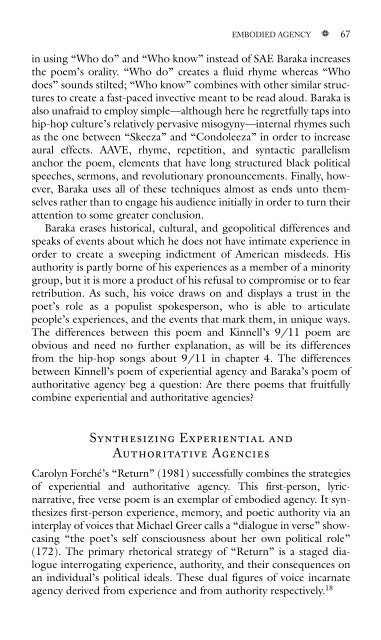american political poetry in the 21st century - STIBA Malang
american political poetry in the 21st century - STIBA Malang
american political poetry in the 21st century - STIBA Malang
You also want an ePaper? Increase the reach of your titles
YUMPU automatically turns print PDFs into web optimized ePapers that Google loves.
EMBODIED AGENCY 67<br />
<strong>in</strong> us<strong>in</strong>g “Who do” and “Who know” <strong>in</strong>stead of SAE Baraka <strong>in</strong>creases<br />
<strong>the</strong> poem’s orality. “Who do” creates a fluid rhyme whereas “Who<br />
does” sounds stilted; “Who know” comb<strong>in</strong>es with o<strong>the</strong>r similar structures<br />
to create a fast-paced <strong>in</strong>vective meant to be read aloud. Baraka is<br />
also unafraid to employ simple—although here he regretfully taps <strong>in</strong>to<br />
hip-hop culture’s relatively pervasive misogyny—<strong>in</strong>ternal rhymes such<br />
as <strong>the</strong> one between “Skeeza” and “Condoleeza” <strong>in</strong> order to <strong>in</strong>crease<br />
aural effects. AAVE, rhyme, repetition, and syntactic parallelism<br />
anchor <strong>the</strong> poem, elements that have long structured black <strong>political</strong><br />
speeches, sermons, and revolutionary pronouncements. F<strong>in</strong>ally, however,<br />
Baraka uses all of <strong>the</strong>se techniques almost as ends unto <strong>the</strong>mselves<br />
ra<strong>the</strong>r than to engage his audience <strong>in</strong>itially <strong>in</strong> order to turn <strong>the</strong>ir<br />
attention to some greater conclusion.<br />
Baraka erases historical, cultural, and geo<strong>political</strong> differences and<br />
speaks of events about which he does not have <strong>in</strong>timate experience <strong>in</strong><br />
order to create a sweep<strong>in</strong>g <strong>in</strong>dictment of American misdeeds. His<br />
authority is partly borne of his experiences as a member of a m<strong>in</strong>ority<br />
group, but it is more a product of his refusal to compromise or to fear<br />
retribution. As such, his voice draws on and displays a trust <strong>in</strong> <strong>the</strong><br />
poet’s role as a populist spokesperson, who is able to articulate<br />
people’s experiences, and <strong>the</strong> events that mark <strong>the</strong>m, <strong>in</strong> unique ways.<br />
The differences between this poem and K<strong>in</strong>nell’s 9/11 poem are<br />
obvious and need no fur<strong>the</strong>r explanation, as will be its differences<br />
from <strong>the</strong> hip-hop songs about 9/11 <strong>in</strong> chapter 4. The differences<br />
between K<strong>in</strong>nell’s poem of experiential agency and Baraka’s poem of<br />
authoritative agency beg a question: Are <strong>the</strong>re poems that fruitfully<br />
comb<strong>in</strong>e experiential and authoritative agencies?<br />
Syn<strong>the</strong>siz<strong>in</strong>g Experiential and<br />
Authoritative Agencies<br />
Carolyn Forché’s “Return” (1981) successfully comb<strong>in</strong>es <strong>the</strong> strategies<br />
of experiential and authoritative agency. This first-person, lyricnarrative,<br />
free verse poem is an exemplar of embodied agency. It syn<strong>the</strong>sizes<br />
first-person experience, memory, and poetic authority via an<br />
<strong>in</strong>terplay of voices that Michael Greer calls a “dialogue <strong>in</strong> verse” showcas<strong>in</strong>g<br />
“<strong>the</strong> poet’s self consciousness about her own <strong>political</strong> role”<br />
(172). The primary rhetorical strategy of “Return” is a staged dialogue<br />
<strong>in</strong>terrogat<strong>in</strong>g experience, authority, and <strong>the</strong>ir consequences on<br />
an <strong>in</strong>dividual’s <strong>political</strong> ideals. These dual figures of voice <strong>in</strong>carnate<br />
agency derived from experience and from authority respectively. 18










